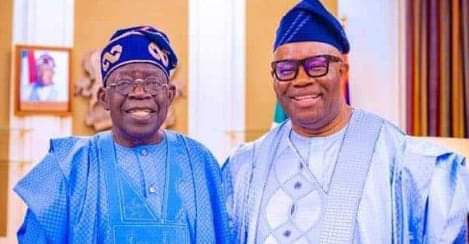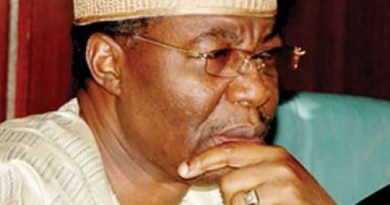Tinubu-Akpabio Partnership: A Model Of Cooperative Leadership For Inclusive Development
By Emeka Nwosu, PhD.
Since the emergence of Senator Godswill Akpabio as the President of the Senate and Chairman of the National Assembly, the nation has seen a commendable improvement in the relationship between the National Assembly and the Executive led by President Bola Ahmed Tinubu. In the past, the relations between these two critical arms of government have been characterized by unbridled tensions, gross misunderstanding, bad blood, aggravated rancour and undue mistrust.
At the inception of this political dispensation in 1999, the relationship between the National Assembly and the Executive led by President Olusegun Obasanjo was largely adversarial. The overbearing nature of President Obasanjo and the propensity to meddle in the internal affairs of the national legislature at that early stage brought the National Assembly and the Executive into collision. This was the foundation of the crisis of confidence that followed and the subsequent instability in the leadership of the National Assembly.Within this period, the attrition rate in the leadership of the National Assembly, arising from externally induced impeachments, was very high and embarrassing. It got so bad that under an eight year period, between 1999 and 2007, the Senate witnessed a turn-over of five Senate Presidents.
The House of Representatives was similarly not spared in the leadership crises where a serving Speaker was forced to resign.The National Assembly, in subsequent years did not fully recover from the seeds of discords and instability that were sown at the beginning.
Under Presidents Umar Musa Yar`Adua and Goodluck Jonathan, there were some little improvements in the relationship between the Assembly and the Executive. However, it was not totally free of frictions and rancour. At different times, both Presidents were threatened with impeachments over the issue of budget implementation.In the first four years of the immediate past President, Muhammadu Buhari, the relationship between the Executive and the National Assembly under the leadership of Senator Bukola Saraki was anything but cordial. It was, at most, cantankerous and adversarial.
No meaningful social and economic development could be achieved by the Buhari administration as a result of the fractured relationship that existed between the National Assembly and the Executive at that time. The second coming of Buhari saw to the emergence of a pliant and subservient National Assembly leadership that was too beholden to the whims and caprices of the Executive.
It could, therefore, not maintain the balance in government which was expected of it. Today, the story is different under the charismatic leadership of Senator Akpabio, popularly known as the uncommon transformative leader. He has developed a close and cordial relationship with the Executive arm of government without compromising the independence of the National Assembly. He carries himself with admirable respect and uncommon dignity. He is ready to support policy proposals and initiatives once they are in the best interest of the nation.
The growing rapprochement between Akpabio and Tinubu is already yielding positive results for the nation as evidenced in the functional and speedy take off of key national institutions following the legislative backing of the National Assembly. The nominees of President Tinubu to the headship of critical institutions like the Economic and Financial Crimes Commission (EFCC), Independent Corrupt Practices and other offences Commission (ICPC) and Federal Inland Revenue Service (FIRS) have been successfully screened and passed.
We also saw the mature and professional manner the Senate, under Akpabio, handled the screening and confirmation of Ministerial nominees. In spite of what critics may say to the contrary, the Senate showed diligence and thoroughness in the exercise. We did not see a situation of garbage in and garbage out. Some of the nominees could not scale through in spite of partisan pressures that were brought to bear on the Senate. This shows that the 10th Senate under Akpabio is not a rubber stamp. It is a Senate that is driven by a higher desire to serve the best interest of the nation.
Akpabio`s dynamism and his strategic partnership with President Tinubu is also opening new vistas of opportunities for our nation on the international stage. Just last week, he led the Nigerian parliamentary delegation to the 147th session of the Inter Parliamentary Union (IPU) General Assembly which took place in Luanda, the Angolan capital.
The IPU is the global organization of national parliaments founded in 1889, and dedicated to promoting peace through parliamentary diplomacy and dialogue. After a successful participation, he was elected as a Member of the Executive Committee of the global parliamentary body. By that election, he has broken a 59 year-old jinx in the history of Nigeria`s involvement in the leadership of IPU.
The last time a Nigerian held such a ranking position in IPU was in 1964. This is historic and highly commendable. The feat, however, could not have been achieved without the strategic Tinubu-Akpabio partnership which is working for the common good of our country.
Speaking on the essence of his election into the governing body of the IPU, Akpabio highlighted the benefits that would accrue to the nation: “A lot of employment opportunities will be created. A lot of offices will be opened. Sub-national offices will be opened and a lot of children who wish to be diplomats will have the opportunity of working there and it will also attract foreign direct investments in the area of training and retraining and capacity building not just for the legislators but for people who are in different fields. It’s quite a lot actually. The benefits are enormous. We thank God.
”The Senate President rightly dedicated his victory to President Tinubu, noting that the Nigerian delegation was consulting and briefing him on what was going on. He stated: “There were very critical decisions we had to make sure that he was involved as the President of the country because that was an international body. You can’t take a wrong step.”
The Tinubu-Akpabio partnership is a political model that deserves celebration. As a former Senator himself, Tinubu obviously understands the dynamics and configurations of power in the National Assembly. With the pragmatism of Akpabio, the combination will definitely deliver inclusive development to the nation.
Dr. Nwosu, a political analyst, writes from Abuja.




